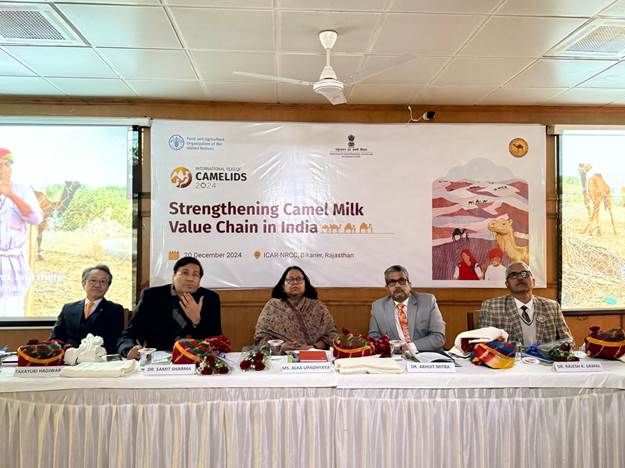From Desert Heroes to Nutraceutical Superfood – India Aims to Conserve Camels; Unlock Potential of Camel Milk Industry
The United Nations has declared 2024 as the International Year of Camelids. The Department of Animal Husbandry and Dairying (DAHD), Ministry of Fisheries, Animal Husbandry and Dairying in collaboration with the Food and Agriculture Organization of the United Nations (FAO) and ICAR – National Research Center on Camel organized a day-long stakeholder workshop on ‘Strengthening Camel Milk Value Chain in India’ on Friday, 20 December 2024 in Bikaner, Rajasthan.

The event aimed to stimulate and facilitate a dialogue between different stakeholders to unlock the challenges that can contribute to the sustainable development of the non-bovine (camel) dairy value chain, along with its nutraceutical and therapeutic values. The event saw participation of more than 150 individuals representing the camel rearers of the states of Rajasthan, Gujarat, government officials, social enterprises, scientists and academicians along with representatives from National Rainfed Area Authority, National Dairy Research Institute- Karnal, Sarhad Dairy- Kutch, Lotus Dairy and Amul. The participants brainstormed to identify the challenges faced by the non-bovine milk sector in India, especially the camel milk and finding sustainable solutions for development of the camel rearers by involving all stakeholders in the value-chain.
During the keynote address, Ms. Alka Upadhyaya, Secretary, Department of Animal Husbandry & Dairying (DAHD), highlighted about the dwindling camel population in India. She called for immediate action to prevent their further decline in population, stressing upon the role of the National Livestock Mission in ensuring sustainable grazing lands and supporting camel-rearing communities. Highlighting the need for a robust camel milk value chain, she emphasized on its economic potential while encouraging conservation efforts. Her address urged stronger outreach to camel farmers to understand their challenges and provide targeted interventions to secure both their livelihoods and the future of camels in India.
Dr Abhijit Mitra, Animal Husbandry Commissioner, DAHD called for the need to conduct a brief study on reasons for the decline in the camel population in the country. He underscored the importance of camel milk for its nutraceutical and therapeutic properties rather than just its supplementary considerations. He also emphasized the need to promote nucleus breeding farms and breeders’ societies for camels.
Mr Takayuki Hagiwara, FAO Representative in India, said, “Through collaborative efforts with DAHD and other key stakeholders, FAO is committed to strengthening the non-bovine milk value chain in India. By combining expertise from government, research, and industry, we aim to unlock new opportunities for sustainable growth, enhance livelihoods, and promote the nutritional and therapeutic benefits of non-bovine milk. Together, we can build a resilient, market-driven ecosystem that empowers farmers and improves food security across the nation”.
Dr. Samit Sharma, Secretary, Animal Husbandry Department, Government of Rajasthan addressed the gathering and informed the action taken by the State for development of the Camel sector. He also highlighted the need to protect the camel population through organizing more pashumelas, camel competitions, promoting eco-tourism and value added products.
Further inputs were sought from the stakeholders on prospects and challenges along with the identification of a socially inclusive institutional model that can strengthen procurement, milk standardization, pricing mechanism and market feasibility to develop pathways for value addition. Detailed deliberations also took place on the importance of value chain development including value addition and pricing mechanism of camel milk as well as research development. During the discussion entrepreneurs demanded that the Government should handhold the entrepreneurs to develop the infrastructure for milk processing at the initial steps that will encourage entrepreneurs to invest in the sector. The workshop also highlighted the efforts made towards conservation of camels through its breed development, having a concerted clinical trial on therapeutic properties of camel milk and value chain development in breeding, production, milking capacities, product development and creating a niche market for the camel milk. Vibrant camel races and decoration competitions were also organized during the event. The event forms an integral part of the UN International Year of Camelids 2024 with the slogan – “Heroes of the deserts and highlands: nourishing people and culture” – to recognize and celebrate the vital contribution camelids make to livelihoods, food security, nutrition and culture, thus achieving the Sustainable Development Goals (SDGs).
The workshop was also attended by Mr Jayen Mehta, Managing Director, AMUL (virtual participation), Dr Falguni Thakar, Director, Department of Animal Husbandry, Gujarat, Dr RK Sawal. Director, NRCC, Pro Vice Chancellor, Rajasthan University of Veterinary and Animal Sciences, Bikaner and Mr Valumji Bhai Humble, Chairman, Kutch Milk Union & VC, GCMMF, Gujarat amongst others. The event also witnessed participation of representatives from the Border Security Force that has a camel corps and plays an important role in border patrolling and other services.
Original News Source: Press Information Bureau

